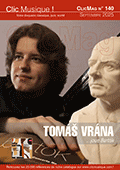 C’est un programme plutôt éclectique qui nous est proposé ici, associant une œuvre coécrite en 1881, par Gabriel Fauré et son élève André Messager, dans un style assez "fin de siècle", et un motet pénitentiel baroque aux effets contrastés (sur le texte du Ps. 50/51 Miserere) que Johann Sebastian Bach composa en 1740 à partir de la partition du "Stabat Mater" de Giovanni Battista Pergolesi. Si l’univers religieux du sceptique maitre de chapelle de La Madeleine, et du futur compositeur de "Véronique" semble assez éloigné de celui du Cantor de Leipzig, la fonction de chacune des deux œuvres diffère également puisque la première est initialement vouée à être interprétée au cours d’un concert donné dans une petite paroisse normande au profit des pêcheurs et de leur famille ; quant à la seconde, elle ne fut redécouverte qu’au cours du 20e siècle. Ce qui rassemble ici les deux pièces, c’est l’approche décomplexée qu’en offrent les interprètes, à savoir deux solistes, un chœur féminin plutôt aérien et un ensemble de chambre, tous dirigés par une musicienne non moins talentueuse. L’aspiration à l’authenticité qu’ambitionne cette production est principalement à chercher dans la fraicheur avec laquelle elle nous est livrée. (Alain Monnier)  When two composers work on a piece, the extraordinary is bound to result: this was the case with the “Messe des pêcheur de Villerville”, which Gabriel Fauré wrote together with his student André Messager, as well as with Bach’s rendition of Pergolesi’s Stabat Mater. Johann Sebastian Bach never visited Italy, but he had a profound musical interest for the Mediterranean country, performed the works of Palestrina and rearranged concertos by Vivaldi. Bach studied the Stabat Mater by Giovanni Battista Pergolesi from a hand-written copy. He liked it so much that he spent considerable time on it: Not only did he replace the Latin words with a German adaption of the 51. psalm and tailored the music to fit the new text, but he also made several other changes. He replaced movements, changed their structure, enhanced the autonomy of individual parts and skilfully recomposed entire sections. Nevertheless, he paid his Italian colleague a great deal of respect and left the character of the piece unchanged. Therefore, Bach’s “Tilge, Höchster, meine Sünden” is as totally Bach as it is Pergolesi. With the “Messe des pêcheur de Villerville” the Mädchenchor Hannover, directed by Gudrun Schröfel, embarks on a journey to the France of late Romanticism. The Hannover Allgemeine Zeitung called the girls’ choir’s performance “a feast for the ears!”.
 |
